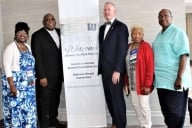You have /5 articles left.
Sign up for a free account or log in.
The U.S. Supreme Court ruled Monday in a patent case that could have significant implications for basic academic research -- though scientists are divided on whether those implications are good or bad.
The court's ruling came in a case known as Merck KGaA v. Integra Lifesciences I (No. 03-1327), which grew out of research sponsored by Merck, a German company, and conducted by David Cheresh, a scientist at the Scripps Research Institute. In his search for treatments for rheumatoid arthritis, psoriasis and other inflammatory diseases, Cheresh utilized some drug compounds on which Integra Lifesciences owned the patents. After Merck declined to license the patents, Integra sued for infringement in 1996.
A lower court and then the U.S. Court of Appeals for the Federal Circuit, in a divided June 6, 2003 decision, sided with Integra, ruling that a "safe harbor" provision of federal patent law protects only research that is directly produces information that helps the U.S. Food and Drug Administration prove that a drug is effective and safe -- work typically done in clinical trials late in the process, rather than early-stage, more basic biomedical research.
Merck appealed the decision to the Supreme Court, arguing that the appeals court had defined the safe harbor provision too narrowly.
In a friend of the court brief, a group of research institutions and higher education associations urged the court not to take the case, leaving intact the lower courts' rulings. The institutions, which included the University of California, the American Council on Education, and the Wisconsin Alumni Research Foundation, argued that expanding the reach of the exemption "would have an adverse effect on the research community as a whole, and the university research community in particular," by undercutting the value of patents and, in turn, potentially reducing the willingness of drug companies to sponsor academic research.
The universities' brief suggested that if pharmaceutical companies couldn't be certain of the sanctity of their patents for work done by university researchers, they would be less likely to sponsor academic work. The brief also argued that "an overextended safe harbor as applied to research patents may encourage more universities to protect technology as trade secrets, licensing the technology as such, thereby resulting in a similar, corresponding reduction in the dissemination of scientific information."
But the U.S. government filed a brief urging the court to take the case and to reverse the lower court rulings, which it said would limit the development of new drugs.
In its ruling Monday, the Supreme Court sided with Merck, rejecting what Justice Antonin Scalia called the "unduly narrow interpretation" of the patent law's safe harbor provision.
In contrast to the position taken by the universities that filed the brief, David Korn, senior vice president for biomedical and health sciences research at the Association of American Medical Colleges, said he was "delighted" by the Supreme Court's decision. He said allowing more research to be conducted "without being encumbered by a lot of intellectual property issues" will result in better results and more "therapeutic treatments."
Korn said he understands that there is debate among academic scientists over the issue, in part because "a lot of institutions are hoping they hit the magic jackpot with intellectual property" related to their scientific research.









